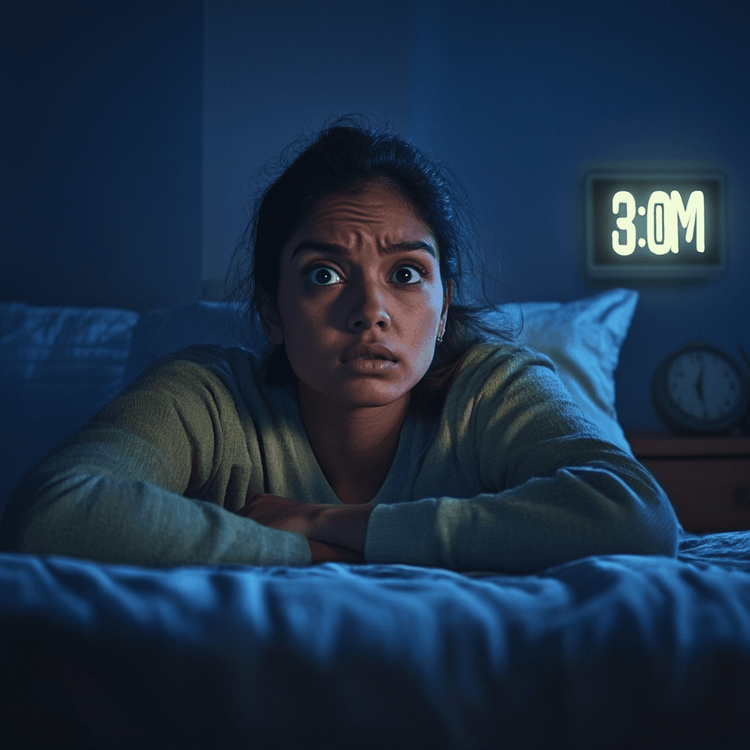Impacts of Insomnia on the Human Body You Should Know
Last Updated At: 24 Jul 2025
9 min read

Table of Contents
In today’s fast-paced world, sleep is often sacrificed for productivity. However, when occasional sleepless nights become a chronic pattern- called insomnia- the effects can be far-reaching. Insomnia doesn’t just make you tired; it disrupts almost every function in the human body, from brain function and immunity to emotional health and even appearance.
In this blog, we’ll uncover the 11 most significant impacts of insomnia on the human body and explore why getting quality sleep isn’t a luxury- it’s a necessity.
1. Impaired Cognitive Functioning
Sleep is essential for memory consolidation, attention, and decision-making. Insomnia affects the brain’s ability to focus, retain information, and solve problems effectively.
Students with poor sleep are more likely to perform poorly in exams.
Adults may make more errors at work due to a lack of mental clarity.
Did You Know? The brain clears out toxins and strengthens neural connections during deep sleep. Lack of sleep leaves your brain foggy and confused.
2. Weakened Immune System
Chronic insomnia weakens the immune system, making the body more prone to infections and slower to recover from illness. People with sleep issues catch colds more frequently and take longer to heal from minor wounds.
When your body doesn’t rest properly, it can’t produce cytokines, the proteins needed to fight infections and inflammation.
3. Increased Risk of Heart Disease
Poor sleep raises blood pressure and increases inflammation, both of which are risk factors for cardiovascular diseases. Studies show that people suffering from insomnia are more likely to develop:
Heart attacks
Irregular heartbeats
Stroke
Long-term insomnia leads to an overproduction of stress hormones like cortisol, damaging blood vessels over time.
4. Weight Gain and Metabolism Disruption
Insomnia alters hormones like leptin and ghrelin, which regulate hunger and satiety. Sleep-deprived individuals tend to:
Eat more unhealthy food
Crave carbohydrates
Skip physical activity due to fatigue
This imbalance leads to weight gain, insulin resistance, and even type 2 diabetes.

5. Poor Emotional Regulation and Mental Health
One of the most evident effects of insomnia is mood swings and emotional instability. Chronic insomnia is closely linked to:
Depression
Anxiety
Irritability
Emotional outbursts
Lack of sleep limits the brain’s ability to regulate emotions, resulting in overreactions or feelings of sadness.
Want your child to learn how to express themselves clearly and manage emotions better? Enroll in PlanetSpark’s Public Speaking Program, where we build emotional confidence through spoken English training.
6. Reduced Learning and Academic Performance
Children and teens who suffer from insomnia show:
Lower concentration levels in school
Decreased ability to retain information
Poor reading comprehension and writing skills
A sleep-deprived child often struggles in both academics and co-curricular activities.
Our English Grammar and Reading Comprehension Courses at PlanetSpark are specially designed to strengthen cognitive and language skills for young learners. Book a free trial today.
7. Accelerated Skin Aging and Appearance Changes
The phrase “beauty sleep” exists for a reason. During sleep, the body boosts collagen production, which helps keep skin youthful. Insomnia can lead to:
Dark circles
Puffy eyes
Dull skin tone
Wrinkles and sagging skin
Inadequate sleep hinders cell repair, making one look older than their age.
8. Digestive and Gastrointestinal Issues
Insomnia disrupts the body’s digestive processes, often resulting in:
Bloating
Acid reflux
Constipation
Sleep plays a major role in keeping gut flora balanced. An unhealthy gut can lead to poor nutrient absorption and an increase in digestive discomfort.
9. Hormonal Imbalance
Insomnia wreaks havoc on the endocrine system. It causes irregularities in:
Cortisol – leading to stress
Insulin – leading to weight gain and diabetes
Growth Hormones – affecting childhood development
For growing children, sleep is vital for both physical and mental development.
Give your child the foundation they deserve with our Spoken English and Cognitive Development programs. At PlanetSpark, we ensure your child learns in a structured, stress-free, and sleep-supportive way.
10. Decreased Motor Function and Coordination
Lack of sleep impairs motor skills, which affects balance, coordination, and even handwriting in children. In adults, it increases the risk of accidents and injuries, both at home and on the road.
Poor sleep affects the brain’s cerebellum, which is responsible for movement and coordination.
11. Reduced Attention Span and Productivity
Insomnia makes it difficult to stay focused for long periods. This leads to:
Poor academic outcomes for students
Missed deadlines at work
Difficulty in completing daily chores
The reduced energy levels caused by sleep deprivation also lower motivation and creative thinking.
Tired of your child struggling to focus in class or during exams? Our PlanetSpark Confidence Building and Communication courses include strategies to improve focus and learning stamina. Try it now!
12. Hormonal Imbalance
One of the lesser-discussed but critical effects of insomnia is hormonal disruption. When you sleep, your body regulates and produces key hormones like melatonin (which regulates sleep cycles), cortisol (the stress hormone), insulin (which manages blood sugar), and growth hormones. Insomnia disturbs this delicate balance.
Chronic sleep deprivation causes cortisol levels to rise, which not only leads to increased stress but also weakens the immune system. Additionally, disrupted insulin production increases the risk of type 2 diabetes and weight gain, especially around the midsection. Hormonal imbalance can also affect reproductive health in both men and women, further proving how deeply insomnia interferes with bodily functions.

13. Increased Sensitivity to Pain
Studies have shown that people suffering from insomnia have a lower pain threshold. The lack of restorative sleep interferes with the brain's ability to regulate pain perception, making individuals more sensitive to discomfort or even chronic pain conditions like fibromyalgia or migraines.
This creates a vicious cycle - lack of sleep increases pain, and chronic pain disrupts sleep even more, trapping people in a loop that's difficult to escape without intervention.
14. Poor Decision-Making and Risky Behavior
Insomnia significantly affects the prefrontal cortex, the brain's center for reasoning, logic, and decision-making. When sleep-deprived, people are more likely to make impulsive choices, engage in risky behavior, or misjudge situations. This is especially dangerous for teenagers and young adults, who already have underdeveloped decision-making regions in the brain.
In real-life situations, such as driving, working with machinery, or even managing finances, insomnia can increase the likelihood of errors and accidents.
15. Suppressed Creativity and Problem-Solving Skills
Sleep is closely tied to cognitive flexibility, which includes creative thinking, innovation, and problem-solving. Individuals who suffer from insomnia often find it difficult to brainstorm ideas, connect abstract concepts, or complete tasks that require originality.
This can be especially detrimental for students and professionals in creative industries or high-responsibility roles. A good night’s sleep rejuvenates the mind and fosters new connections in the brain, helping people think outside the box.
16. Increased Risk of Substance Abuse
Many people with insomnia turn to alcohol, caffeine, or sleeping pills in an attempt to fall asleep or stay awake. Over time, this can lead to dependency and substance abuse disorders. What starts as a temporary fix can spiral into addiction, further worsening insomnia and damaging the liver, brain, and overall mental health.
Early behavioral intervention and guidance from experts, like those at PlanetSpark, can help young learners and parents manage sleep-related anxiety and stress through holistic skill development and emotional support.
PlanetSpark Helps Children Build Better Routines and Mental Strength
At PlanetSpark, we recognize that mental well-being and confidence go hand-in-hand. Our programs incorporate life skills like time management, focus building, self-discipline, and healthy screen habits, all of which contribute to better sleep patterns and improved self-esteem.
Also, check the following links:
Explore our Confidence Building Course for Class 4 Kids
Check out Public Speaking & Personality Development for Class 6
How to Prevent and Manage Insomnia Naturally
While insomnia can be caused by lifestyle, stress, or even underlying medical conditions, several practical steps can help prevent it:
Maintain a regular sleep schedule
Avoid screen time an hour before bed
Limit caffeine and sugar intake in the evening
Create a calming bedtime routine
Use relaxation techniques like deep breathing, reading, or meditation
Teaching children these habits early builds a lifetime of healthy sleep hygiene.
Conclusion
Insomnia may start as a small issue, but its ripple effects can impact every part of the human body. From hormonal imbalance to weakened immunity and poor academic performance, it affects more than just your ability to fall asleep at night.
If your child is experiencing issues related to concentration, confidence, or communication that may be rooted in sleeplessness, PlanetSpark’s expert programs can help. With our live online English, public speaking, and cognitive courses, we ensure your child grows holistically.
Sleep better, learn better, live better- with PlanetSpark.
FAQs
1. What are the most common physical symptoms of insomnia?
The most common physical symptoms include fatigue, frequent headaches, weakened immunity, increased heart rate, muscle aches, and digestive issues. Long-term insomnia can also lead to high blood pressure and hormonal imbalances.
2. Can insomnia affect emotional health and behavior?
Yes, insomnia is closely linked with anxiety, irritability, mood swings, and even depression. Lack of sleep affects the brain’s emotional regulation system, leading to lower patience, reduced impulse control, and an overall decline in mental well-being.
3. How does insomnia impact academic or professional performance?
Insomnia reduces concentration, short-term memory, focus, and decision-making abilities. This can result in poor academic outcomes for students and lower productivity or increased errors at work for professionals.
4. What is the long-term impact of untreated insomnia?
Chronic insomnia can contribute to serious health risks such as cardiovascular disease, obesity, diabetes, and cognitive decline. It also increases the likelihood of developing mental health disorders and substance abuse issues if left untreated.
Personalized Communication Report
Record a video to get a AI generated personalized communication report for your child
Select Learner's Class

Hi There, want to try these
tips for your child with
LIVE with our expert coach?
Let's check your child's
English fluency
